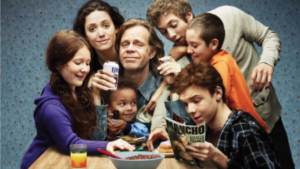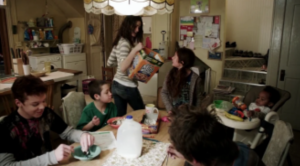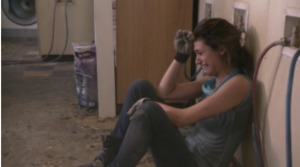62 Shameless (2011-2021)
Diving Deep into Difference, Power, and Oppression in Shameless
by Kylee Dickman
Shameless, an American comedy-drama produced by John Wells illustrates the everyday struggles of a less fortunate family with absent parents, and their experience with difference, power, and oppression. The show follows the Gallagher family over 11 years as they grow up on the south side of Chicago. Their family is known for doing whatever it takes to get by. The Gallagher family consists of six siblings, Fiona, Lip (Philip), Ian, Debbie, Carl, and Liam as well as their father Frank, who is usually at the bar or passed out under the overpass. The children’s mother, Monica, is a bipolar junkie who ran out on them, and only visits in a few episodes. Fiona is the oldest daughter who must take care of her younger siblings. She was 21 years old when the show began, but she had been taking care of her siblings since she was 9. Every Gallagher sibling must find a way to contribute to the family so they can survive, making them all very close but prone to disagreements. Every character’s development, for better or for worse, relates to the oppression and discrimination they experienced during childhood. Not only is Shameless a funny, drama-filled series that will have you hooked for all 11 seasons, but it also takes a deep dive into the concepts of power, difference, and oppression.

In the pilot episode of Shameless, we are introduced to the characters and settings. Also, we are introduced to the differences between the Gallaghers and traditional families. The Gallagher home is clearly very old and lived in. We meet the Gallagher family as well as a few side characters that are important for the main characters’ development. As the episode starts the neighborhood gathers around a bonfire as Frank describes his family. As he talks highly of his children, at least for him, a clip of them having problematic behaviors appears in the background. For example, he says “Lip, smart as a whip, straight A’s and the honor roll, boys definitely going somewhere.” In the background, Lip is running down an alley away from a police car. Later in the series, we see Lip go to a college, but his struggles with poverty and alcoholism cause him to get kicked out. He calls Debbie a total angel sent from god and adds that she raises money for UNICEF year-round, and some of it she actually turns in, implying that she steals most of it. We later see her get arrested because she fights a homeless person while begging on the street to raise money for her daughter. Frank states that he is proud of all his children because they all remind him of himself. Given the fact that Frank does not have many redeeming qualities, we can assume that every family member has their problems and differences. Following his introductions Frank exclaims, “We might not know much but we sure know how to party.” Police cars show up and they all run away. Getting in trouble with the police is a common occurrence for their family because their fight for survival often leads to illegal activities.
Episode one gives insight into the daily life of a Gallagher as they are oppressed by poverty. Following the introduction scene we see the Gallagher family sitting at their kitchen table as they eat breakfast and gather money for the power bill. When they were short 18 dollars Debbie asked if Carl contributed anything, followed by stating, “You’re almost nine, you’re going to have to start pulling your weight, by getting a real job.” The fact that nine and ten-year-olds understand they must work to support their family shows they grew up oppressed. In an article titled “Things In The Pilot Episode of Shameless you never noticed”, author Sylvia-Marah Boune mentions how Debbie forges her signature on Ian’s permission slip, making it clear that the kids have accepted responsibility for taking care of themselves and each other.

An example of oppression presented in Shameless is the relationship between Mickey Milkovich, Ian’s love interest, and his father. The Milkovich family is known for their violent tendencies and chaos. Mickey’s father Terry, who had been in and out of jail his whole life, is a racist, homophobe, who was abusive to his children and feared by everyone in town. In the earlier seasons, Mickey has a hard time accepting his sexuality and expressing his love to Ian. When Terry catches the boys together he hires a prostitute and forces Mickey to have sex with her. She gets pregnant and Terry forces them to get married. Mickey still loves Ian who is giving him an ultimatum to not go through with the marriage and come out. After the wedding, Mickey tells the whole bar that he is gay. No one seems to care until Terry gets up screaming and ends up beating up Mickey and Ian. As Terry gets arrested again Ian and Mickey have the biggest smiles on their face not caring that they are covered in blood with cracked ribs. Once Mickey realizes that no one else cares about him being gay and he doesn’t need his father’s approval, he starts to be more open and strengthens his relationship with Ian. In the last season when Ian and Mickey are set to get married, Terry burns down the venue. Through a series of extravagant ideas and everyone’s help, they are able to have their wedding after all. The relationship between Mickey and his father illustrates how he was oppressed in his own home but was accepted by the Gallager family. Mickey grew as a character because he was able to leave his toxic environment and accept himself. In an article titled “The Gallagher’s Character Development in Shameless,” Fallyn Mahoney agrees that Mickey overcoming his living conditions and family allowed him to learn and grow alongside Ian. Mahoney acknowledges that “fans believe Mickey and Ian’s relationship is one of the best in the series and made a huge impact on the LGBTQ community.”

A family of six children that have to raise themselves, each other, and their own children is bound to have a conflict of power. In the early seasons, we mainly see Fiona as the primary parental figure with Frank trying to be a father every now and then. A few times during the series their mother Monica would come home and they would try to be a family. Her return never lasted more than a week and usually ended in a traumatic experience for the children. In season 4 episode 5, we see Lip take the initiative of power after Fiona goes on a bender and accidentally leaves drugs out for 5-year-old Liam to discover. She was hauled off to jail leaving Lip in charge. Lip hotly expressed his frustration towards Fiona and criticized her parenting ability. At this time Fiona had just been granted partial custody of the children and Lip felt she was undeserving of that power. Being the two eldest siblings, Lip and Fiona constantly got into arguments over what was best for the family, but their competitive nature only kept them closer. They also both inherited alcoholism from their father and were there for each other whenever one of them fell off.
Throughout Shameless we witness how the difference in class affects the characters. In season 7 Fiona decides that she is tired of just being a girl for the south side, and wants to make something of herself. She is inspired by a successful businesswoman who grew up poor and didn’t finish high school, like Fiona. To start her business endeavors she buys a laundromat that was owned by an old lady with dementia. Fiona tries everything to repair the building and make it a nice new spot but she is confronted with all sorts of problems, broken machines, leaky pipes, moldy floor tiles, and whatever else could go wrong. At this time the southside of Chicago was starting to be gentrified by new establishments. A company that was building next door offered to buy the property. Fiona declined, convinced that she could turn it into a success. However after a breakdown, and realizing that the check for the building was not cashed, Fiona took it down and let the company buy it. Fiona did not give up just yet, she bought an apartment building which was making her some money. She then decided to invest in a new town project despite being advised not to. She quickly realized that she could not afford the investment and was completely put out. Luckily another partner of the project agreed to buy her out of the contract as well as buy her apartment building. It is unfortunate to see that Fiona’s dreams of defying the odds failed. We also see this earlier when Lip gets kicked out of college. It does however give a sense of reality to what it’s like for someone that grows up lower class. With their lack of parenting and living situation, the Gallaghers are at odds, and rarely do we see them defied.

Prior to Fiona moving away in season 9 Debbie took over running the house. At this point, all the siblings were adults except for Liam who was 10. Since none of the other siblings needed a parental figure, Liam was left to fend for himself. Debbie abused her power and was selfish towards her siblings. When Fiona was struggling and did not have enough for the water bill, Debbie turned off the water while she was showering. When Liam didn’t have his share of the bills he was forced to sleep outside. Debbie was also a mother to her own child which she had at 15. Debbie was extremely protective of her daughter Franny and occasionally let it get out of control. She tried to live the childhood she never got to have vicariously through Franny. When Fiona left, a conflict of power between Lip and Debbie started to grow. Lip suggested that they sell the house and split the money to all start their own lives. Debbie was very adamant about them staying together because she selfishly didn’t want to be alone. She does whatever she can to stop Lip from progressing with the sale and it becomes a whole family argument. They eventually settled on selling with the agreement that they would see each other every weekend. Growing up without parental role models was the most difficult for Debbie and caused her to be emotionally dependent on others.
The portrayal of drunkenness, bipolar episodes, and mental breakdowns in Shameless feels very realistic and captures what it’s really like for someone with those issues. In addition to its powerful themes and engaging storylines, the visual elements of Shameless are impeccable. The casting for this show was a match made in heaven. Every actor fully commits to their character and portrays emotion to the fullest. The flow of how scenes are edited between each character’s story is very effective for communicating the theme of each episode. As revealed in the first episode, the series contains juxtaposition between scenes to show multiple points of view.
Whether we analyze a specific character, episode, or scene, examples of difference, power, and oppression are embedded into all 134 episodes of Shameless. The show follows the life story of a poor family as they battle with aspects of addiction, sexuality, mental illness, physical abuse, and trauma. Despite their daily fight for survival, the Gallagher family stays close and always has each other. Overall, shameless takes a comedic and dramatic approach to emphasize the challenges of difference, power, and oppression.
References
Mahoney, F. (2021, April 22). “The Gallagher’s character development in “Shameless” (2011-2021). The Daily Fandom. https://thedailyfandom.org/the-gallaghers-character-development-in-shameless-2011-2021/
Boune, S.M. (2022, February 7) “Things In The Pilot Episode of Shameless You Never Noticed.” Looper

